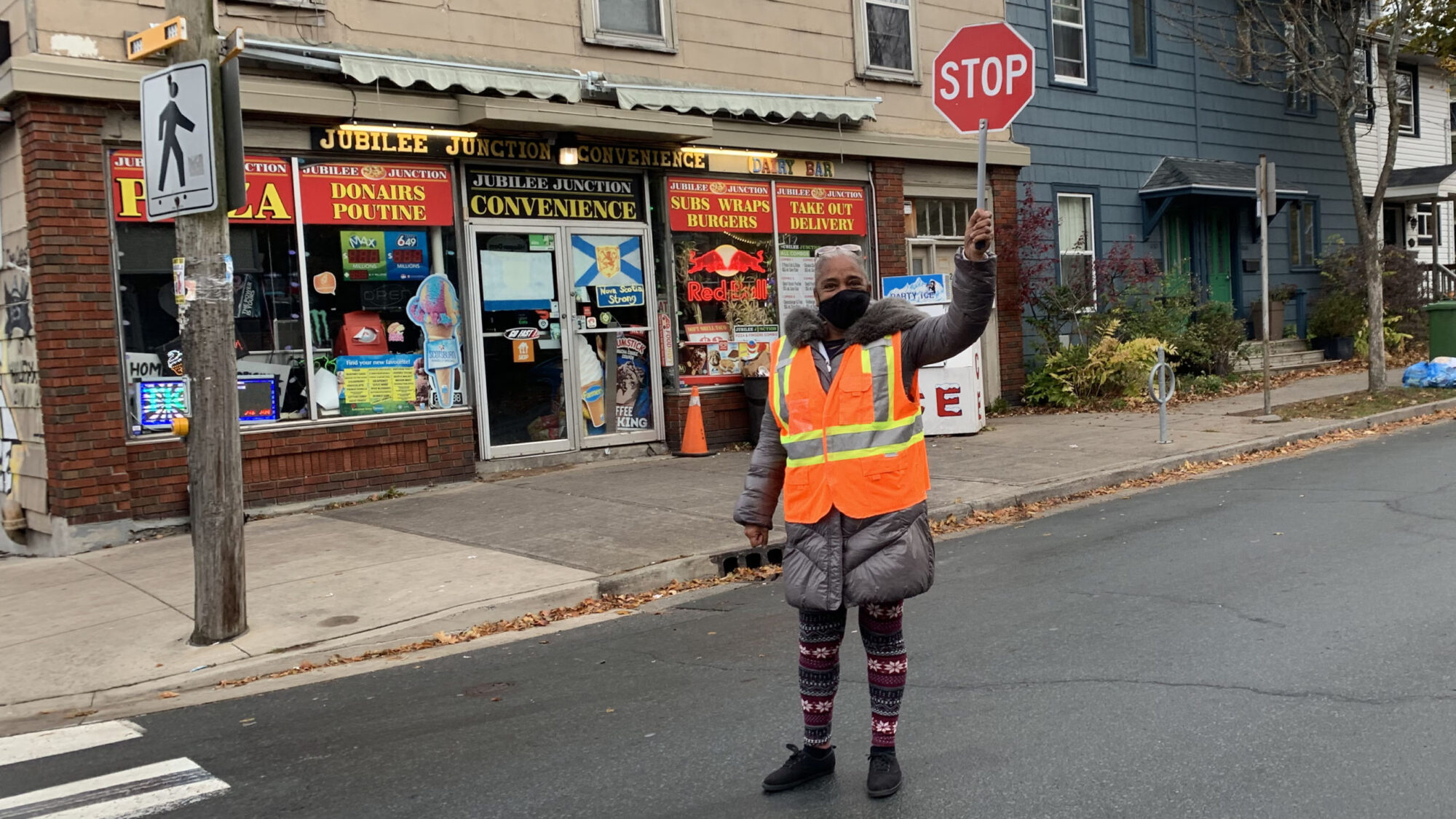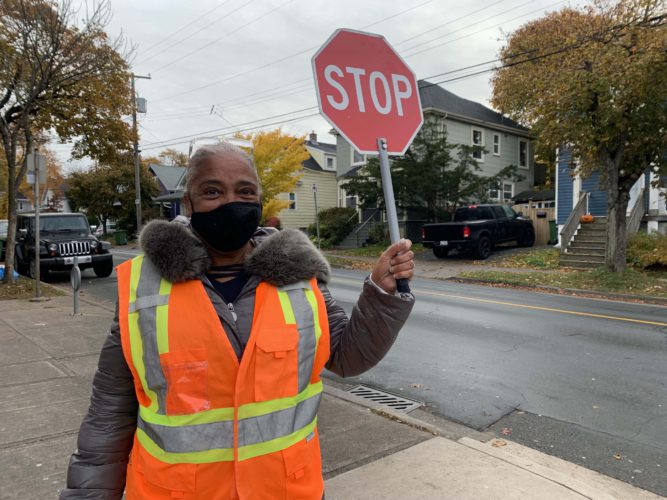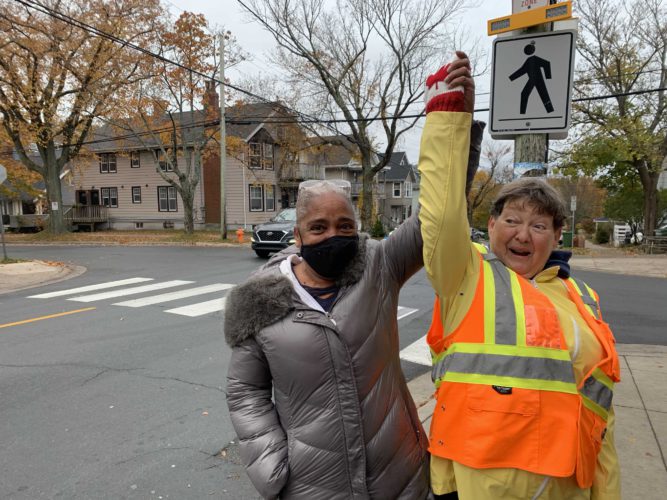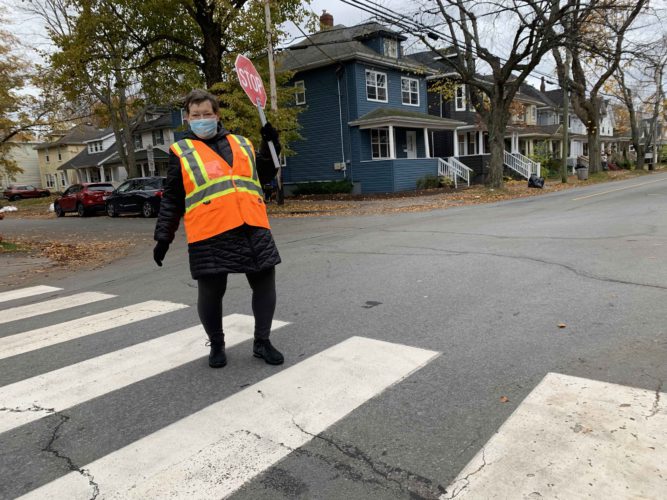Access to washrooms: The hidden problem crossing guards face
Crossing guards regulate traffic, keep Halifax schoolkids safe, but with no place to go

caption
Mable Chisholm in front of the convenience store she uses for washroom breaks, on Monday.Mable Chisholm is there every morning to make sure dozens of kids get across the street safely, but when Chisholm has to answer the call of nature, there’s nowhere to, um, go.
“It’s one of the basic problems in the profession,” Chisholm said in an interview. “We have to depend on the generosity of strangers, like the store owner here. I’m lucky because he lets me use it, but not everyone is like that, and then you have to go look for one.”

caption
Mable Chisholm likes her job as a crossing guard.Chisholm does three crosswalk guard shifts per day, five days a week, from Monday to Friday, with each shift lasting between one to two hours. She guards an intersection near Halifax Central Junior High School, in the Quinpool area.
In addition to aggressive drivers, cold weather, and occasional disrespectful pedestrians, Chisholm said poor access to washrooms is a common problem guards face when wearing the uniform.
According to Nova Scotia’s labour standard rules, employers must give workers a rest period. The rules dictate employees are to be given breaks to eat, and rest, but do not apply to employees working under a collective agreement.
Crossing guards have one, and their collective agreement makes no mention of washroom breaks.
When hired for the job, crossing guards are also given a handbook, which also does not mention washroom breaks. The assumption is crossing guards will eat, rest, and use the washroom when they are not working.
But access to washrooms can be difficult when guarding crosswalks. Chisholm said the lack of access to washrooms also affects the kids they’re trying to protect.

caption
Mable Chisholm prepares for work on Monday.“One day I had to leave my shift early because the convenience store was not open and I had to use the bathroom,” Chisholm said.
“By the time I walked to McDonald’s, had I walked back, my shift would’ve been over, and that leaves the spot wide open for kids that got no one here to watch over them as they cross the street.”
Michael Habib, who works at the convenience store where Chisholm takes her washroom breaks, said he has a lot of compassion for crossing guards, but the answer is not in providing bathrooms for them.
“You know how many Johnny-on-the-spots are going to be out there,” Habib said, referring to portable restroom rentals.
“These Johnny-on-the-spots are not going be used just by crossing guards only, they are going to be used by everyone in the public. And that is going to become a nuisance.”

caption
Mable Chisholm (left) and Irene-Ann Hinde shake hands before a full day of work, on Monday.Irene-Ann Hinde has been guarding crosswalks since 1999. She uses a cane and also struggles to access a washroom during her shifts. Walking, for her, is more difficult than it is for the average crossing guard.
“We need an outhouse,” Hinde said. “Because we’re trying to look for washrooms to go to, and everyone else has a washroom and we don’t.”
Hinde said she has done shifts back-to-back, totalling over four hours without a washroom. She said that makes her feel vulnerable.
“You also have to use and rely on neighbours,” Hinde said. “I am lucky because I have one couple who lets me use theirs, but otherwise, I’d be without a washroom when I need one.”

caption
Irene-Ann Hinde poses near a crosswalk on Monday.Claire Ryan lives three doors down from the crosswalk where Hinde works. She said she helps Hinde whenever possible, but this is not always viable, as Ryan works and is not always home.
“Our local crossing guard, we let her come in and use the restroom,” Ryan said. “We’ll make her a coffee and we’ll give her snacks, so we’re happy to do that, but of course that depends if we’re available that day, and we aren’t always available.”
Ryan thinks public institutions, like schools, could be a good alternative for crossing guards, especially for crossing guards like Hinde, who struggle with walking.
“We help when we can,” Ryan said. “And we know that she’s struggling in that way, ’cause it’s cold, it’s rainy and she has some mobility concerns. I definitely feel for her, it’s definitely a tough situation. I’ve been thinking about it, and I think the local schools should let the crossing guards use their restrooms there.”
The crossing guards’ local union, CUPE, declined comment because they are in the process of electing a new local president.

caption
Irene-Ann Hinde wants to keep people safe.Chisholm and Hinde are determined to continue in their roles.
“The job is physically demanding,” Hinde said. “I had an injury to this leg, and it’s hard to stand up, but I still do my job because I want to keep people safe, both children and adults.”
“I enjoy what I do,” Chisholm said. “I love kids, and they have great trust in me, and that’s why I’m here. To keep my children safe.”
About the author

Abel Rangel
Abel Rangel is a screenwriter and journalist working and living in Halifax, N.S. He earned a master’s degree in transgender studies at New...

C
Cheryl